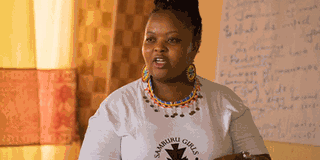Changing the FGM story one girl at a time

Ms Wanjiru Wahome, program manager of Samburu Girls Foundation, has liberated many girls and women in Samburu, from the fangs of FGM and early marriage. PHOTO | POOL | NATION MEDIA GROUP
She didn't have to go through the cut to better understand the painful experience associated with female genital mutilation (FGM).
Wanjiru Wahome’s inspiration to join this mission was sparked by a woman, whose story of resilience after going through circumcision and getting married at 11 years, got her questioning her purpose of existence.
She quit her job as a human resource personnel in Nairobi and travelled to Samburu to begin a new life.
Liberate girls
"I thought to myself, I wasn't making much of an impact while in Nairobi, thus I needed something that could make a difference in the lives of other girls and women going through such a nightmare," she says.
Ms Wahome is an anti-FGM champion in Samburu, and the program manager of Samburu Girls Foundation. This is a position she has held for nearly seven years, and which she has used to liberate girls and women in the region, from the fangs of FGM and early marriage.
Apart from her regular duties which include technical work, writing proposals and meeting with donors, she the visits to grassroots and participating in the one on one liberation missions is something she holds dearly.
The walk from village to village, sensitizing the community about the health implications of female circumcision motivate her more.
"We also give refuge to girls who run from their homes to escape being circumcised or being married off," she adds.
Local schools
The organisation has teamed up with local schools to offer school fees subsidies to girls.
"This is, of course, apart from holding other small sensitisation campaigns where we teach them about basic hygiene and communication skills, among other things," she explains.
This mission has taken them to different regions within Samburu County, and in the process, more than 1,500 girls have benefitted, with an additional 440 girls currently under the program.
The project has played a major role in demystifying myths about FGM, reducing cases of the vice, and dealing a blow to early marriage perpetrators. As a result, more local girls have completed their education.
"We have cultivated a culture of giving back to the community, and in the process, seen a significant number of girls who have benefitted from the project have come back to offer their services as volunteers."
It, however, has not been a walk in the park for Ms Wahome who has had to navigate through many challenges.
Court cases
"This tradition is still entrenched in this part of the world, and the main challenge has been convincing the locals otherwise," she explains.
She laments about the slow pace of court cases against perpetrators, a fact that has seen them drag for years.
Then there is the trauma that comes with handling most of the cases.
"Some of these girls run from home after being circumcised, and we've had cases where girls have showed up at the rescue centre with fresh wounds, a painful experience even for us who are not going through it," she says.
She recalls a case of a nine-year-old girl who sort refuge at the premises after going through FGM and was about to be married off to a 38-year-old man.
"When she came, her wound was still fresh and she was in a lot of pain and we thought apart from the physical treatment, she also needed psychological treatment," she says.
It is such cases that push Ms Wahome deeper into this work.
As of now, despite the challenges, Ms Wahome shows no signs of relenting in her fight, adding that her satisfaction is to see more girls, not just in Samburu, but all over Kenya, get help to better their lives in future.




